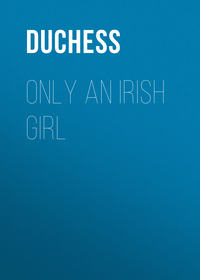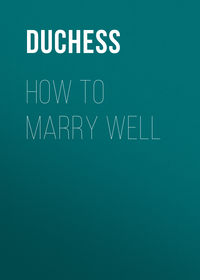 полная версия
полная версияПолная версия
Rossmoyne
"Oh, thank you!" says Monica, gratefully smiling at her.
"Tut, child! thank me when I have done something for you. It is Fred's turn to thank me now," says Madam O'Connor, with a merry twinkle in her gray eyes.
She is a large woman close on sixty, with an eagle eye and a hawk's nose. As Monica leaves her she continues her gossip with the half dozen young men round her, who are all laughing at some joke. Presently she herself is laughing louder than any of them (being partial to boys and their "fun," as she calls it). Bestowing now a smart blow with her fan upon the youngest and probably therefore most flippant of her attendants, she stalks away from them across the lawn, to where two ladies are sitting together.
One is elderly, but most ridiculously dressed in juvenile attire, that might have well suited the daughter sitting beside her. This latter is a tall girl, and large in every way, with curious eyes and a rather harsh voice; she is laughing now at some remark made by a man lounging at the back of her chair, and the laugh is both affected and discordant.
"Have you seen that girl of Kitty Beresford's, Edith?" asks Madam O'Connor of the elder lady.
"That little washed-out-looking girl who came with those two old Miss Blakes?" asks the youthful old woman, with a profoundly juvenile lisp.
"Faith, I don't know about her being washed out," says Madam O'Connor, bluntly. "I think she is the prettiest creature I've seen this many a day."
"You are so impulsive, my dear Theresa!" says her friend, with a simper: "all your geese are swans."
"And other people's swans my geese, I suppose," says Madam, with a glance at the tall girl, which somehow brings the conversation to a full stop.
Meantime, Monica is crossing the soft turf, with the moody man called Rossmoyne beside her. She can see her goal in the distance, and finds comfort in the thought that soon she must be there, as she cannot bring herself to be agreeable to her new acquaintance; and certainly he is feeling no desire just at present to be agreeable to her or to anybody.
As Monica comes nearer to her friend, she gazes anxiously at her, as though to see if time has worked a change in her.
She is quite a little woman about five and twenty, but looking at least four years younger than that. Her eyes are large, dark, and mischievous. Her hair is so fair as to be almost silvery; naturally wavy, it is cut upon the forehead in the prevailing fashion, but not curled. Her mouth is small, mutinous, and full of laughter; her nose distinctly retroussé. Altogether she is distractingly pretty, and, what goes for more nowadays, very peculiar in style, and out of the common.
She is exquisitely dressed in a costume that suggests Paris. She is a harmony in black and white, as Lord Rossmoyne told her an hour ago, when he was not wearing his discontented expression. Seated beside her is a tall pallid woman with a cold face, but very velvety eyes and a smile rare but handsome. Every now and then this smile betrays itself, as her companion says anything that chances to amuse her. She is a Mrs. Herrick, a cousin of Olga Bohun's, and is now on a visit with her at Aghyohillbeg.
There are several men grouped round Mrs. Bohun, all in various standing positions. One man is lying at her feet. He is a tall slight young fellow, of about twenty-three, with a lean face, dark hair, and beautiful teeth. He has, too, beautiful eyes, and a most lovable expression, half boyish, but intensely earnest and very sensitive.
Just now he appears happy and careless, and altogether as if he and the world are friends indeed, and that he is filled with the belief that every one likes him; and, in truth, he is right in so believing, for every one does like him, and a great many are fond of him, and some love him.
He is looking up at Mrs. Bohun, and is talking rapidly, as Monica and Lord Rossmoyne come up behind them.
"What! another bit of scandal?" exclaims Mrs. Bohun, lifting her brows in pleased anticipation. "The air seemed full of it. An hour ago I heard of the dire discomfiture of two of my dearest friends, and just now I listened to a legend of Belgravia that was distinctly fifi and had a good deal to do with a marchioness. It is really quite too much happiness for one day."
"My tale does not emanate from such an aristocratic region as Belgravia," says Ulic Ronayne, the man at her feet: "it is, I blush to say, from the city."
"Ah!" in a regretful tone; "then it will of course be decenter. Don't trouble to expend color on it, as I daresay there isn't a blush in the whole of it. Well," resignedly, "go on."
In the usual quick manner habitual to him, and with the slight but eloquent amount of gesture common to Irish people, Ronayne tells his news, which is received with low laughter by those around.
"I've heard better stories," says Mrs. Bohun, discontentedly; "and it isn't a bit like what Lord Tommy would do. It is more in Rossmoyne's line. I don't think I believe it. And the roundabout way in which you told it reminds one of a three-volume novel: the first leads up to the point, the third winds up the point, the second is the point. I confess I like the second volume best. When I grow funny over my friends I'm all second."
"Then don't be funny about me, please," says Ronayne, lazily.
"Are you my friend?" asks she, glancing at him. Lifting his eyes to hers, he pauses, and then says slowly, the smile dying from his face, —
"Well, perhaps not."
Then he lowers his eyes again, and goes back to his idle occupation of decorating with daisies some of the fantastic loops upon her gown.
At this moment Lord Rossmoyne, coming forward, says, sullenly, "May I hear the story that just now reminded you of me? But first – " He pauses, and glances at Monica. Mrs. Bohun, following his glance, rises hurriedly from her seat, and going up to the girl, embraces her warmly.
"Ah! my pretty Monica! my little saint!" she cries, in her sweet, gay voice, "what happy breeze has blown you hither?"
"I am living here, – at Moyne, – with my aunts," in a happy, breathless way. "Some days ago they described you to me, and I knew it must be you. I was right. And to-day I have found you."
"I'm always found out, as a rule," says Mrs. Bohun, with a light laugh. "That is my standing grievance. You know Hermia, don't you?" indicating the tall, cold-looking woman near her, who so far unbends as to take Monica's hand kindly and bestow upon her one of her handsome smiles. "She has come here to look after me and see that I don't get into a scrape or make myself unhappy."
"Could you be unhappy?" says Rossmoyne, from behind her chair, in so disagreeable a tone that every one looks at him. "Decidedly," thinks Monica to herself, "he has either neuralgia or an execrable temper."
"Miserably so," says the pretty widow, airily. "Though, after all," reflectively, "I believe I have even a greater talent for making others so. That, however, is my misfortune, not my fault. I was 'born so,' like that poor man with the twisted neck."
"Well, this is not one of your miserably unhappy hours, at all events," says Hermia Herrick. "You have been in magnificent spirits ever since you came to Aghyohillbeg."
"You've learned it?" says Olga, staring at her with pretended surprise. "The name, I mean. Well, you are clever. It takes most people four long weeks. Oh, yes, I am blissfully happy here. I ought to be. It would be the grossest ingratitude if I were otherwise, as all the men have been good enough to fall in love with me, and that, of course, is the principal thing."
At this the young man at her feet smiles openly and presses his face unperceived against her gown; but Rossmoyne throws up his head and glances with a coldly displeased expression into the vague distance.
"Have you been here long?" asks Monica, turning to her friend.
"Very long," pettishly. Something – perhaps Rossmoyne – has annoyed the capricious beauty.
"Only a fortnight," says Mrs. Herrick, briefly. "You must know that."
"I don't judge time by days and weeks; it seems long," says Mrs. Bohun, "years, – an eternity almost!"
A sudden gloom appears to have fallen upon the group. Rossmoyne's dark face grows darker still; the smile fades from Ronayne's face, a shadow falls athwart his eyes.
"I think I like the country," says Monica, suddenly. "It is so calm, so quiet, and there are moments when the very beauty of it brings tears to my eyes."
"I love it too," says Ronayne, quickly, addressing her pointedly in a friendly tone, although no introduction has been gone through between them. "I wonder how any one who has once tasted the sweetness of it can ever again long for the heat and turmoil of the town."
"Yes, for a time it is charming, all-sufficing," says Mrs. Bohun, "but for what a little time! Perhaps, – I am not sure, – but perhaps I should like to live for three months of every year in the country. After that, I know I should begin to pine again for the smoke and smuts of my town."
"If you are already wearied, I wonder you stay here," says Lord Rossmoyne, sullenly.
"And I wonder what has happened to-day to your usually so charming temper," returns she, laughingly uplifting her face to his, and letting her eyes rest on him with almost insolent inquiry.
"Desmond says good temper is a mere matter of digestion," says some one at this moment. Monica starts more at the name mentioned than at the exceedingly worn-out words uttered. She glances at the speaker, and sees he is a very ugly young man, with a nice face, and a remarkably dismal expression. He is looking at Rossmoyne. "Sit down, dear boy," he says, sotto voce and very sadly. "There's too much of you; you should never stand. You appear to so much better advantage when doubled in two. It don't sound well, does it? but – "
"But really, when you come to think of it," Mrs. Bohun is saying, feelingly, "there is very little in the country."
"There is at least the fascinating tulip and lily," says the sad man who mentioned Desmond's name. "Don't put yourself beyond the pale of art by saying you had forgotten those æsthetic flowers, – blossoms, I mean. Don't you yearn when you think of them? I do."
"So glad you are awake at last, Owen!" says Mrs. Bohun.
"That silly craze about tulips," says Mrs. Herrick, contemptuously, "I have always treated it with scorn. Why could not the art idiots have chosen some better flower for their lunatic ravings? What can any one see in a tulip?"
"Sometimes earwigs," says the man called Owen.
"Nonsense! I don't believe even earwigs would care for it. Foolish, gaudy thing, uplifting its lanky neck as though to outdo its fellows! There is really nothing in it."
"Like the country," says Owen, meekly, "according to Mrs. Bohun."
"And like Bella Fitzgerald," says that graceless person, with a little grimace.
"My dear Olga," says Mrs. Herrick, glancing quickly to right and left. "Do you never think?"
"As seldom as ever I can. But why be nervous, Hermia? If any one were to compare me with a tulip, I should die of – no, not chagrin —joy, I mean, of course. Monica, what are you saying to Owen?"
"I don't think I know who Owen is," says Monica, with a glance at the gentleman in question, that is half shy, half friendly.
"That argues yourself unknown," says Olga. "He is Master Owen Kelly, of Kelly's Grove, county Antrim, and the bright and shining light of the junior bar. They all swear by him in Dublin, – all, that is except the judges, and they swear at him."
Monica looks at Master Owen Kelly in a faintly puzzled fashion.
"It is all quite true," says that young man, modestly, in a reassuring tone.
"Now tell us what you were saying to each other," says Olga.
"It was nothing," returns Monica. "We were only talking about this Egyptian war. But I don't really," nervously, "understand anything about it."
"You needn't blush for your ignorance on that score," says Mr. Kelly. "You're in the general swim: nobody knows."
"It is the most senseless proceeding altogether," says Hermia Herrick, in her decided way. "Gladstone's wars are toys. He has had three of them now, dear little fellow, to amuse himself with, and he ought to be proud of his victories."
"According to Erasmus, war is the 'malady of princes,'" says Lord Rossmoyne, sententiously.
"Rossmoyne isn't well," says Mr. Kelly, softly. "He is calling the wood-cutter a prince. It reminds one of Hans Andersen's fairy-tale: all hewers of wood and drawers of water were blood-royal then."
"Yet Gladstone has intellect," says Mrs. Herrick, in oh, such a tone: would that the master of Hewarden could have heard her!
"Some!" said Mr. Kelly. "He is indeed 'a thing apart.' I know nothing like him. 'Once, in the flight of ages past, there lived a man.' In ages to come they will say that of our modern immortal William. They will probably add that no real man has ever lived since."
"How silly you can be at times!" says Olga.
"It isn't mine; it's Montgomery's nonsense," says Mr. Kelly, sadly. "Blame him, not me."
"I don't want to blame any one," says Olga, with a skillfully-suppressed yawn; "but, taking your view of the case, I think it will be an awful age when there doesn't live a man."
"Your 'occupation will be o'er,' indeed," says Rossmoyne, with an accentuated bitterness, "when that time comes."
("He must be very much in love with her," thinks Monica, with a touch of inspiration, "he is so excessively rude to her!")
"Lord Rossmoyne," says Mrs. Bohun, turning to him with ineffable sweetness, "will you do something for me?"
The transition from coldness to tender appeal is too much for Rossmoyne: his face brightens.
"You know there is nothing I would not do for you," he says, gravely but eagerly.
"Then," promptly, "please take that ugly frown off your forehead and put it in your pocket; or – no, throw it away altogether; if you kept it near you, you might be tempted to put it on again."
"I did not know I was frowning."
"You were," sweetly. "You are all right again now, and so shall be rewarded. You can't think how unbecoming frowns are, and how much better you look when you are all 'sweetness and light' as now for example. Come," rising, "you shall take me for a nice long walk through these delightful old gardens."
As she moves she sees the daisies still clinging to her gown that Ulic Ronayne has been amusing himself with during the past half-hour. More than this, she sees, too, the imploring gaze of his dark eyes upturned to hers.
"Silly boy!" she says, stooping to shake away the daisies with her hand; but her words have a double meaning. Involuntarily, unseen by all the others – except Monica – his hand closes upon hers.
"Do not go with him," he says, with deep entreaty.
"I must – now."
"Then let me come too?"
"No." Then she raises herself, and says, gayly, "You shall stay and make love to Miss Beresford – Monica, I have desired Mr. Ronayne to stay here and amuse you."
She moves across the lawn with Rossmoyne beside her. Mrs. Herrick and Mr. Kelly are strolling lazily in another direction. Monica and Ulic are alone.
"Is there anything I can take you to see?" asks he, gently.
"No, thank you. I am quite happy here."
Then, noticing the extreme sadness on his beautiful face, she says, slowly, "But you are not, I am afraid."
"I should be, with so fair a companion." He smiles as he says this, but his smile is without mirth, and she does not return it. Suddenly leaning forward, she says to him, very tenderly, —
"You love Olga, do you not?"
She never afterwards thinks of this speech without blushing deeply and wondering why she said it. It was an impulse too strong to be conquered, and it overpowers her. His face changes, and he colors perceptibly; he hesitates too, and regards her inquiringly. Something, perhaps, in her expression reassures him, because presently he says, bravely, —
"Yes, I do. I love her with all my heart and soul; as I never have loved, as I never shall love again. This thought is my happiness: my sorrow lies in the fear that she will never love me. Forgive my saying all this to you: she told me to amuse you," with a faint smile, "and I have woefully neglected her commands."
"You must forgive me," says Monica. "I should not have asked you the question."
"Do not be sorry for that: it has done me good, I think. I am glad I have said it out loud to somebody at last. It is odd though, – isn't it? – I should have made my confession to you, of all people, whom I never saw until ten minutes ago!"
Then Monica remembers that this is the second young man she has found herself on friendly terms with since her arrival at Moyne, without the smallest introduction having been gone through on any side. It all sounds rather dreamy, and certainly very irregular.
"Ah! there is Madam O'Connor beckoning to me," says Ronayne, rising lazily to his feet. "I suppose she wants me for a moment. Will you mind my leaving you for a little, or will you come with me? I shan't be any time."
"I shall stay here," says Monica. "There, go: she seems quite in a hurry. Come back when you can."
He runs across the grass to his hostess; and Monica, leaning back in her chair, gives herself up to thought. Everything is strange, and she is feeling a little lonely, a little distraite, and (but this she will not allow even to herself) distinctly disappointed. She is trying very hard to prevent her mind from dwelling upon a certain face that should be naught to her, when she suddenly becomes conscious of the fact that some one has come to a standstill close beside her chair. She turns.
CHAPTER VII
How Monica listens to strange words and suffers herself to be led away. – How Cupid plants a shaft in Mars, and how Miss Priscilla finds herself face to face with the enemy.
"You see I failed," says Brian Desmond.
A quick warm blush has dyed Monica's cheeks crimson.
"Ah! it is you," she said. "I thought you had not come."
This betrays the fact that she has been thinking of him, but he is far too wise a young man in his own generation to take count of it.
"Yes, I came. Three days ago I thought I should have been in London now, and then I heard you were to be here to-day."
"In what have you failed?" asks she, abruptly, alluding to his opening sentence.
"Can't you guess? Have you forgotten the last cruel injunction you laid upon me? 'When next we meet,' you said, 'you are to look straight over my head and pass on.' Will you believe that twice to-day I obeyed that mandate? The third time was the charm: it conquered me; I broke my sword in two and came to you."
"I wish you hadn't," says Monica, sincerely, if impolitely. "I wish you would go away now, and promise me never to speak to me again. You know I am afraid of you," looking nervously around.
"I don't, indeed; I can't conceive such a situation. You do me a great injustice, I think. I verily believe if I tried my very hardest I couldn't instil terror into the smallest child in the village."
"You know what I mean. Of course," scornfully, "I should never be afraid of a man: it is Aunt Priscilla I am afraid of. And see, see there!" in an agony, "she is standing quite close to us, talking to somebody."
"If that is your aunt Priscilla, she is safe for an hour at least. The old lady with her is Lady Rossmoyne, and she never lets any one (unfortunate enough to get into her clutches) go free under a generous sixty minutes. She is great on manures, and stock, and turnips, and so forth. And your aunt, I hear, is a kindred spirit."
"But then there is Aunt Penelope," says Monica, timidly.
"She, too, is arranged. Half an hour ago I met her so deep in a disgraceful flirtation with the vicar that I felt it my duty to look the other way. Depend upon it, she is not thinking of you."
"But some one may tell them I have been talking to you."
"I always thought I had a proper amount of pride until I met you," says Mr. Desmond. "You have dispelled the belief of years. 'Is thy servant a dog,' that you should be ostracized for speaking to him? Never mind; I submit even to that thought if it gives me five minutes more of your society. But listen to me. No one can tell tales of us, because we are both strangers in the land. No one knows me from Adam, and just as few know you from – let us say Eve, for euphony's sake."
She laughs. Encouraged by her merriment to believe that at least she bears him no ill will, Brian says, hurriedly, —
"Come with me to the rose-garden. It is stupid sitting here alone, and the garden is beyond praise. Do come."
"Why?" lifting her heavy lashes.
"For one thing, we shall be free from observation, and you know you dislike being seen with me. For another – " He pauses.
"Well?" rather nervously.
"It is just this, that I must speak to you," says the young man, his gay manner changing to one of extreme earnestness. "You were unkind to me that day we parted. I want you to tell me why. I understand quite that I have no right to demand even the smallest favor of you, yet I do entreat you to come with me."
For another moment she hesitates, then —
"Yes, I will come with you," she says, raising her soft eyes to his. In her whole manner, voice, and bearing there is something so sweet and childish and trusting as to render Desmond her slave upon the spot.
The path to the rose-garden leads away from Miss Priscilla, so they avoid detection as they go.
But they are singularly silent and grave; when the garden is reached they pass between the rows of growing blossoms mute, if rich in thought. At last, when silence is becoming too eloquent to be borne, her companion turns to her.
"It wasn't true what you said to me that last day, was it?" he asks, with far more anxiety than the occasion seems to demand. "Not really, I mean. You said it for fun, perhaps – or – It has been with me ever since. I can't forget it. You said you disliked sudden friendships, and the way you said it made me think you disliked me. Tell me I thought wrong."
"Quite wrong," in a low tone. She is plucking a rose to pieces, and keeps her eyes downcast. "When I said that, I was angry about something."
"About something I said?"
"No. Nothing you said."
"Something I did, then?" growing more and more anxious.
"Ye-es."
"What was it?"
"It doesn't matter now; not in the least now; and I can not tell you, indeed."
"But I wish very much you would. Perhaps, being in wretched ignorance, I shall be so unhappy as to do it again some day, and so make you hate me a second time."
"I didn't hate you."
"No? Yet there was a look in your eyes I wouldn't like to see there again. Do tell me, lest I once more fall into error."
"Oh, no," coloring deeply, as though at some unpleasant recollection. "That would be impossible. It could never happen again. I shall take care of that. I shall never as long as I live get into a – that is – I mean – I – Really I have forgiven it all now, so let us forget it too."
Though still greatly mystified, Mr. Desmond wisely forbears to press the point, something in her pretty distressed face and heightened color forbidding him.
"Very good," he says, pleasantly. "But there is another thing I have not forgotten. Have you ever cleared up that mystery about my uncle and your aunts?"
"Oh! that. It cannot be cleared, I am afraid it is too muddy a tale for any help; but I have at least found out all about it."
"Would it be indiscreet if I said I would give anything to be as wise as you on this subject? In other words, will you divulge the secret?"
"It is a story that doesn't redound to the honor and glory of your house," says Miss Beresford, stepping back from him with a gay little laugh, and glancing at him mischievously from under her big "Patience" hat. "If I were you I should shrink from hearing it."
"I decline to shrink," with unparalleled bravery. "I prefer to rush upon my fate. Life has no longer any flavor for me until I hear what the old reprobate at Coole has done."











